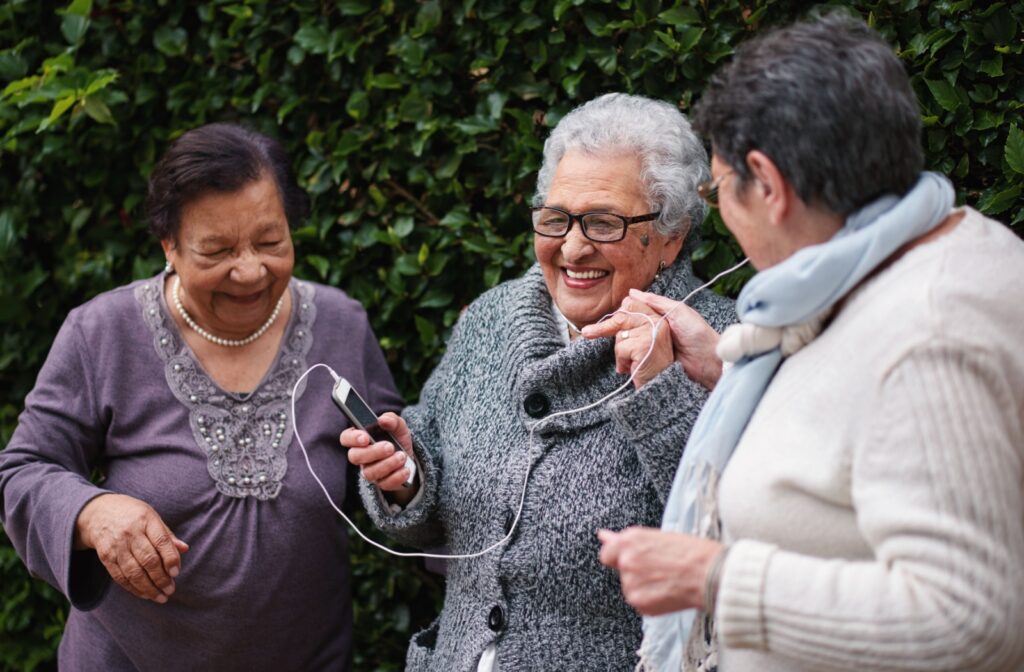Caring for a loved one with dementia can be complicated. However, by seeking professional help from a memory care community, you can get your loved one proper care and support from a team of experienced, compassionate professionals.
In memory care, your loved one gains access to a range of programs and services designed to help slow cognitive decline and promote their overall well-being—like music therapy.
Music therapy is an incredible way to help support seniors living with dementia. It helps stimulate the mind and boost cognitive function while offering a way to relieve stress and enjoy a familiar song. It can even have physical benefits—who doesn’t want to dance every now and then when listening to their favorite song?
What Is Dementia?
Dementia isn’t a specific disease, it’s an umbrella term used to describe a wide range of symptoms closely linked to cognitive decline and memory impairment. These progressive symptoms often cause a decline in a person’s thinking skills, often to the extent of impacting their ability to perform everyday activities.
Dementia often causes:
- Difficulty with problem-solving or complex tasks
- Confusion with time or place
- Challenges in understanding visual information
- Issues with speaking, writing, or finding words
- Changes in mood, behavior, or personality
As the condition progresses, it often leads to the need for professional care from a memory care community.
What Is Memory Care?
In memory care, your loved one is surrounded by a team of experienced caregivers, all with extensive training in supporting older adults with dementia. This is a specialized form of senior living that caters to the needs of those experiencing cognitive decline and memory impairment.
The community offers a structured, safe environment designed to reduce cognitive decline, manage symptoms, and encourage a higher quality of life. It also offers plenty of programs and services—like music therapy—to help keep your loved one happy, healthy, and safe.
What Is Music Therapy?
If you’ve ever played one of your favorite songs after a bad day and immediately felt better, you may have stumbled onto the premise of music therapy.
Music is a powerful tool. Throughout much of human history, there are records of music being a core part of every culture. It has been used within everything from rituals and religious ceremonies to parties and emotional connections.
But one key aspect of music is how it directly affects our brains. It helps us relax and unwind, or get excited to get up and about. Music is an extremely therapeutic tool when used properly, and can offer plenty of cognitive, mental, emotional, and physical benefits.
This is the driving factor that music therapy is based on. By incorporating specific music, whether listened to or played, seniors can reap the benefits of its healing powers. It’s a useful approach designed to help engage, stimulate, and relax older adults living with dementia—and requires nothing more than a song.
How Does Music Therapy Help Seniors with Dementia?
Employing music as a therapy tool isn’t just a theory. It’s rooted in the idea that music can be particularly helpful for enhancing a person’s quality of life. Music therapy aims to provide support to older adults living with dementia in three ways:
- Cognitively
- Mentally
- Physically

The Cognitive Effects of Music
First and foremost, music can have a significant impact on a person’s cognitive abilities. Music is an excellent way to invoke powerful memories, which can improve a person’s ability to recall past experiences both short and long-term.
It also can help assist in the retention of new information, along with a person’s ability to concentrate. Rhythm and melody can help provide cues and triggers that assist the learning process. Just think of how shows for children will often teach a lesson in the form of a song.
This means that listening to music as a form of therapy isn’t just a fun way to enjoy a song; it can improve a person’s cognitive function.
The Mental & Emotional Effects of Music
One of the most notable aspects of music therapy is how it can prompt an emotional release. Many people worldwide use music to help reduce anxiety and agitation—or to elicit happiness, joy, and love. Music has deep roots in helping people emotionally connect and bond.
This is because music can tap into the emotional centers of the brain, activating neural networks involved in reward, motivation, and emotion regulation.
The Physical Effects of Music
If you’ve ever felt yourself subconsciously swaying to your favorite song, you aren’t alone. Music has a strong physical component that can help activate the brain’s motor cortex and stimulate movement.
This can be particularly beneficial for seniors with dementia, as this condition often causes problems with physical coordination and balance. Engaging in repetitive, rhythmic movements can help to improve these motor functions while encouraging physical exercise.
This means that music isn’t just something to dance to, it can have significant physical benefits as well.
How to Help a Loved One with Dementia
The benefits of music therapy for seniors with dementia are undeniable. It’s a bridge to a world that offers clarity, joy, and human connection. Something as simple as a familiar tune can do much more than most people think and is a profound way to support a loved one with dementia.
Your loved one deserves an environment where they can have access to programs like music therapy—an environment like our community at Barton House Nashville. Book a tour today to learn more about how music therapy can help.



